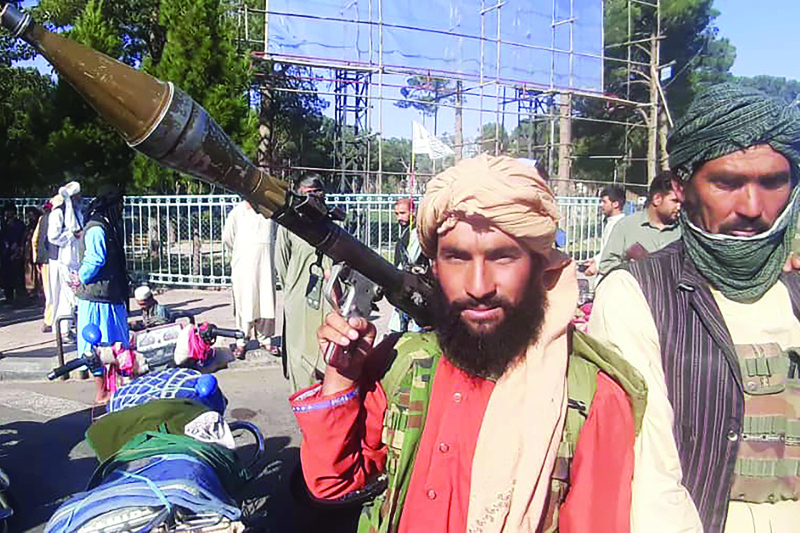 HERAT: A Taleban fighter holds a rocket-propelled grenade (RPG) along the roadside in Herat, Afghanistan's third biggest city, after government forces pulled out the day before following weeks of being under siege. - AFP
HERAT: A Taleban fighter holds a rocket-propelled grenade (RPG) along the roadside in Herat, Afghanistan's third biggest city, after government forces pulled out the day before following weeks of being under siege. - AFP
KABUL: The United States spent billions supplying the Afghan military with the tools to defeat the Taleban, but the rapid capitulation of the armed forces means that weaponry is now fuelling the insurgents' astonishing battlefield successes. "We provided our Afghan partners with all the tools-let me emphasize: all the tools," US President Joe Biden said when defending his decision to withdraw American forces and leave the fight to the locals.
But Afghan defense forces have shown little appetite for that fight and, in their tens of thousands, have been laying down their arms-only for the Taleban to immediately pick them up. The Taleban's social media is awash with videos of Taleban fighters seizing weapons caches-the majority supplied by Western powers. Footage of Afghan soldiers surrendering in the northern city of Kunduz shows army vehicles loaded with heavy weapons and mounted with artillery guns safely in the hands of the insurgent rank and file.
In the western city of Farah, fighters patrolled in a car marked with an eagle swooping on a snake-the official insignia of the country's intelligence service. While US forces took the "sophisticated" equipment with them when they withdrew, the Taleban blitz has handed the group "vehicles, humvees, small arms and light weapons, as well as ammunition", Justine Fleischner of weapons-tracking group Conflict Armament Research, told AFP.
'Massive boon'
Experts say such hauls-on top of unacknowledged support from regional allies such as Pakistan-has given the Taleban a massive boost. The weapons will not only help the Taleban's march on Kabul but "strengthen its authority" in the cities it has captured, said Raffaello Pantucci, senior fellow at the S Rajaratnam School of International Studies. With US troops all but gone, the Taleban now find themselves flush with American-supplied tools, without having to raise a single penny.
"It is incredibly serious. It is clearly going to be a massive boon to them," he said. Some of that weaponry is now being brazenly paraded ahead of the US troops' 9/11 withdrawal deadline by insurgents who have maintained ties with Al Qaeda, the group behind the 2001 terror attacks. Washington had prepared for the Taleban to claim its weapons, but the rapid fall of cities was its most dire scenario, Jason Amerine, who led US special forces in overthrowing the Taleban in 2001, told AFP.
"The US equipped the ANA with the assumption that weapons and materiel might fall into Taleban hands," he said, referring to the Afghan National Army. "The current crisis was a worst-case scenario considered when making procurement decisions."
Propaganda
At Kunduz airport, a Taleban fighter on a red motorbike, head-to-toe in insurgent dress, was filmed staring at a military helicopter sitting on the tarmac. It is a picture of jubilation mirrored across insurgent-held territory. While the group will continue to show off these big prizes, the aircraft at least will have no impact on the battlefield without pilots. "They will be for propaganda purposes only," former CIA counter-terrorism analyst Aki Peritz told AFP.
More useful will be the light arms and vehicles used to navigate the country's rugged terrain. Coupled with the army's dwindling morale, they will boost the threat the Taleban pose to the Western-backed government. As the crisis unfolds, Biden's administration says it will still equip an Afghan military that appears on the verge of collapse.
Observers of the Middle East have seen this transfer of arms play out before.
After the US withdrawal from Iraq, the Islamic State (IS) group overran the Iraqi city of Mosul in mid-2014, seizing US-supplied guns and humvees. The jihadists used their gains to build an Iraqi-Syrian caliphate the size of Belgium. Like IS fighters in Mosul, joyous Taleban recruits are now posing for photographs with enemy munitions in the newly won cities in all corners of the country. "This retreat is turning into a rout," Peritz said. - AFP




